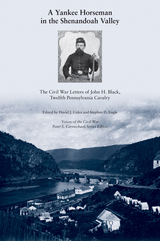3 start with Y start with Y

In June of 1863, Col. William P. Sanders led a cavalry raid of 1,300 men from the Union Army of the Ohio through Confederate-held East Tennessee. The raid severed the Confederate rail supply line from Virginia to the Western Theater and made national headlines. Until now, this incredible feat has been relegated to a footnote in the voluminous history of the American Civil War.
In Yankee Commandos, Stuart Brandes presents readers with the most complete account of the Sanders raid to date by using newly discovered and under-explored materials, such as Sanders’s official reports and East Tennessee diaries and memoirs in which Sanders is chronicled. The book presents important details of a cavalry raid through East Tennessee that further turned the tide of war for the Union in the Western Theater. It also sheds light on the raid’s effect on the divided civilian population of East Tennessee, where, unlike the largely pro-secession populations of Middle and West Tennessee, the fraction of enlisted men to the Union cause rose to nearly a quarter.
Colonel Sanders remains an enigma of the American Civil War. (He was a cousin of Confederate president Jefferson Davis, and his father and three brothers donned Confederate gray at the outbreak of the war.) By studying the legend of Sanders and his raid, Brandes fills an important gap in Civil War scholarship and in the story of Unionism in a mostly Confederate-sympathizing state.

In many ways, John H. Black typified the thousands of volunteers who fought for the Union during the Civil War. Born in 1834 and raised on his family’s farm near Allegheny Township, Pennsylvania, Black taught school until he, like many Pennsylvanians, rushed to defend the Union after the attack on Fort Sumter in April 1861. He served with the Twelfth Pennsylvania Cavalry, one of the Union’s most unruly, maligned, and criticized units.Consistently outperformed early in the conflict, the Twelfth finally managed to salvage much of its reputation by the end of the war. Throughout his service, Black penned frequent and descriptive letters to his fiancée and later wife, Jennie Leighty Black. This welcome volume presents this complete correspondence for the first time, offering a surprisingly full record of the cavalryman’s service from 1862 to 1865 and an intimate portrait of a wartime romance.
In his letters, Black reveals his impassioned devotion to the cause, frequently expressing his disgust toward those who would not enlist and his frustration with friends who were not appropriately patriotic. Despite the Twelfth Pennsylvania’s somewhat checkered history, Black consistently praises both the regiment’s men and their service and demonstrates a strong camaraderie with his fellow soldiers. He offers detailed descriptions of the regiment’s vital operations in protecting Unionists and tracking down and combating guerrillas, in particular John Singleton Mosby and his partisan rangers, providing a rare first-person account of Union counterinsurgency tactics in the Lower Shenandoah Valley. In the midst of portraying heated and chaotic military operations, Black makes Jennie a prominent character in his war, illustrating the various ways in which the conflict altered or nurtured romantic relationships.
One of the few compilations of letters by a long-term Yankee cavalry member and the only such collection by a member of the Twelfth Pennsylvania, A Yankee Horseman in the Shenandoah Valley provides new insights into the brutal, confused guerrilla fighting that occurred in northwestern Virginia. Moreover, these letters make a significant contribution toward an emerging consensus that Yankee cavalry—often maligned and contrasted with their celebrated Confederate foes—became a superior fighting force as the war progressed.
David J. Coles, professor of history at Longwood University, is the associate editor of the Encyclopedia of Civil War, coauthor of Sons of Garibaldi in Blue and Gray, and coeditor of the Encyclopedia of the American Civil War.
Stephen D. Engle, professor of history at Florida Atlantic University, is the author of Yankee Dutchman: The Life of Franz Sigel, Don Carlos Buell: Most Promising of All, and Struggle for the Heartland: The Campaigns from Fort Henry to Corinth.

The way Venable figures it, he’s roaring along the road (at about twenty-seven miles per hour, the average speed for someone his age) to Codgerville. You Gotta Laugh to Keep From Cryin’ highlights the observations and lifestyle changes (and a few other things he can’t quite seem to remember at the moment) that Venable has made along the way.
From the day his wife discovers his first ear hair, Venable begins to recognize the signs of old age. Though he had reconciled himself to daily fiber and a distinguished head of gray, he is one step further to an insatiable desire for cafeteria food and permanently leaving his car’s right turn signal flashing.
The news isn’t all bad, though. To his surprise, Venable discovers that his new appearance and habits have qualified him for the senior discount on breakfast at his favorite restaurant. After reading about a scientific study concluding that men’s brains shrink faster than women’s in the normal aging process, Venable has a new source of excuses to explain to his wife why he is missing important dates, times, places, and appointments.
As an official CIT (Codger In Training), Venable delights in other newfound freedoms. He can stand in a fast-food line and stare at the menu for a full two minutes without saying a word (besides, he can’t hear the people behind him grumbling). He can drive as slowly as he likes and has perfected the art of maintaining a death grip on the steering wheel of his car. And he really doesn’t have to listen to anyone anymore; he can merely turn their way from time to time and mumble, “Huh?”
From the swinging doors whose “Push/Pull” directions elude him to the high-tech mysteries of ATMs designed to baffle the elderly, Sam Venable’s rollicking view of life after fifty will leave readers laughing and happy to be a member of the AARP set.
The Author: Sam Venable, recognized for his humor writing in 2000, 2001, and 2002 by the Tennessee Press Association, is a columnist for the Knoxville News-Sentinel. He is the author of a number of books, including Rock-Elephant: A Story of Friendship and Fishing and Mountain Hands: A Portrait of Southern Appalachia. He lives in Knoxville, Tennessee.
READERS
Browse our collection.
PUBLISHERS
See BiblioVault's publisher services.
STUDENT SERVICES
Files for college accessibility offices.
UChicago Accessibility Resources
home | accessibility | search | about | contact us
BiblioVault ® 2001 - 2024
The University of Chicago Press









